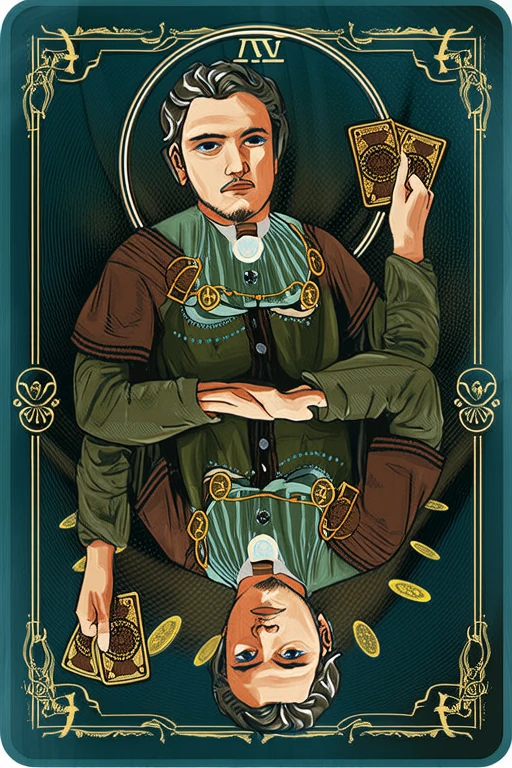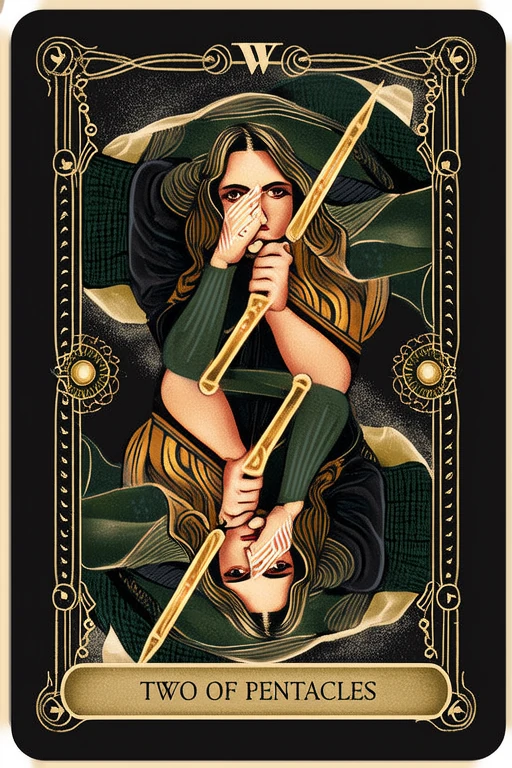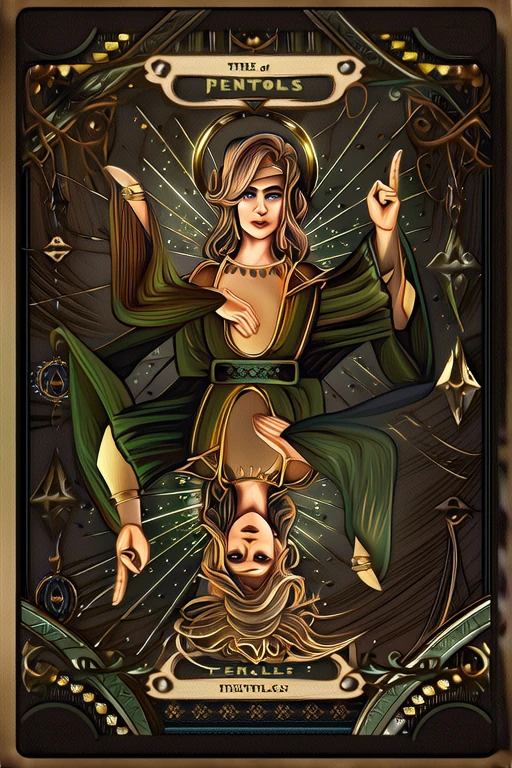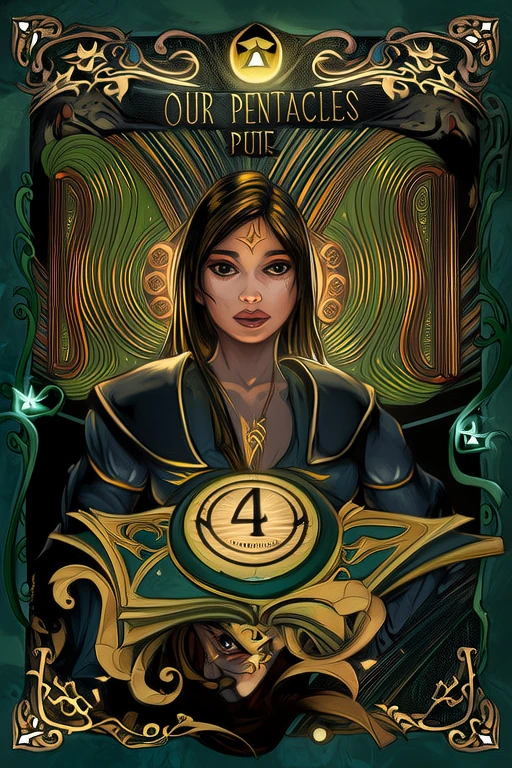
Page of Pentacles
Discover the deep meaning of Page of Pentacles with our free AI-powered tarot interpretation. Get instant, accurate readings based on advanced tarot knowledge.

Keywords
Upright Meaning
Manifestation, financial opportunity, skill development
Reversed Meaning
Self-development, inner alignment, goal setting
Full Interpretation
The Page of Pentacles represents manifestation, new financial opportunities, and skill development.
In-Depth Analysis
📜 Historical Background
The Page of Pentacles, also known as the Page of Coins or Knave of Pentacles in some decks, is one of the 56 Minor Arcana cards in a traditional tarot deck. It belongs to the suit of Pentacles, which is associated with the element of Earth and governs material aspects of life such as wealth, health, and practical matters. The origins of the tarot date back to mid-15th century Europe, particularly in Italy and France, where the cards were initially used for playing games before evolving into tools for divination and esoteric practices in the 18th and 19th centuries.
The earliest known tarot decks, such as the Visconti-Sforza and the Marseille Tarot, depicted the Page of Pentacles as a youthful figure holding a coin or orb, symbolizing learning, apprenticeship, and the early stages of manifesting material success. In these decks, the imagery was relatively simple and symbolic, often featuring a young man holding a pentacle with a contemplative or focused expression, representing the beginning of a journey in the material world.
As tarot evolved during the Hermetic and occult revival of the late 19th and early 20th centuries, especially with the creation of the Rider-Waite-Smith deck by A.E. Waite and Pamela Colman Smith in 1909, the Page of Pentacles took on a more narrative and symbolic form. In this deck, the card shows a young page kneeling and gazing at a large pentacle, often interpreted as a moment of reflection, learning, or preparation before taking action. This imagery has since influenced countless modern interpretations across various tarot decks.
Culturally, the Page of Pentacles has been associated with themes of apprenticeship, education, and financial opportunity. In some European traditions, it is linked to agricultural prosperity and the changing of seasons, reflecting the card’s deep connection to the Earth and natural cycles. Different tarot traditions, such as the Thoth Tarot by Aleister Crowley, interpret the Page of Disks (its name in the Thoth system) with more astrological and alchemical symbolism, connecting it to Mercury in Taurus and emphasizing communication, practicality, and resource management.
Over time, the Page of Pentacles has remained a consistent symbol of potential, growth, and grounded ambition. Whether interpreted through historical, mystical, or psychological lenses, the card continues to offer insight into the foundational steps of material and financial development, making it a vital part of the tarot’s Minor Arcana.
Symbolism & Imagery
The Page of Pentacles is rich in symbolic meaning, with each element of the card contributing to its overall interpretation. At the center of most depictions is a young figure—often a male page or apprentice—kneeling or standing with a pentacle in hand. This posture suggests humility, focus, and the beginning of a journey toward material mastery. The pentacle itself represents wealth, abundance, and the physical world, while the act of holding or studying it implies a process of learning, evaluation, or planning.
Colors play a significant role in the symbolism of this card. Green, often featured in the background or clothing, symbolizes growth, prosperity, and nature. Gold represents wealth, success, and the tangible rewards of effort. Earthy tones like brown and beige reinforce the card’s grounding energy and connection to the material realm. These color choices reflect the card’s alignment with the element of Earth, emphasizing stability, patience, and practicality.
Numerologically, the number one (associated with the Page) signifies beginnings, leadership, and individual potential. As the first court card in the suit of Pentacles, the Page represents the initiation of a material or financial endeavor. The presence of the number one also highlights the importance of self-reliance and taking the first step toward a goal.
Across cultures, interpretations of the Page of Pentacles can vary. In Western esoteric traditions, it is often seen as a message of opportunity, study, and financial planning. In contrast, some Eastern metaphysical interpretations emphasize the card’s role in spiritual grounding and the harmonization of material and spiritual goals. In Celtic traditions, the card may be associated with the harvest season and the rewards of hard labor, linking it to cycles of growth and abundance.
When upright, the Page of Pentacles typically signifies a new opportunity, learning a new skill, or receiving unexpected financial news. It encourages the querent to remain patient, diligent, and attentive to details. In the reversed position, the card may indicate missed opportunities, lack of focus, or financial mismanagement. It can also suggest procrastination or the need to reassess one’s material goals.
In relation to other cards, the Page of Pentacles works closely with the other court cards of the suit—Knight, Queen, and King—representing different stages of material mastery. It also resonates with the Two of Pentacles (balance), the Five of Pentacles (lack), and the Ten of Pentacles (fulfillment). Together, these cards form a narrative of material growth and financial journey, making the Page of Pentacles a foundational piece in understanding the suit’s overall arc.
Psychological Insights
From a psychological perspective, the Page of Pentacles can be interpreted as a representation of the inner apprentice—the part of the psyche that is eager to learn, grow, and build a stable foundation for the future. In Carl Jung’s framework of archetypes, the Page embodies the archetype of the Innocent or the Student, symbolizing curiosity, potential, and the beginning of a journey toward mastery. This card encourages individuals to adopt a mindset of continuous learning and self-improvement, especially in areas related to finance, career, and personal development.
In modern life, the Page of Pentacles is particularly relevant for those embarking on new ventures, whether starting a business, entering a new job, or investing in education. It serves as a reminder to approach opportunities with diligence, patience, and a willingness to learn from experience. The card’s emphasis on practicality and attention to detail makes it a valuable guide in decision-making, especially when evaluating financial or career-related choices.
For personal growth, the Page of Pentacles encourages individuals to set realistic goals and take small, deliberate steps toward achieving them. It supports the development of self-discipline, financial literacy, and the ability to plan for the future. Those who resonate with this card may find themselves drawn to structured learning, budgeting, or long-term investments in both material and personal resources.
In therapeutic and counseling contexts, the Page of Pentacles can be used to explore issues related to self-worth, financial anxiety, and motivation. Counselors and life coaches may use this card to guide clients toward practical solutions, encourage goal-setting, and reinforce the importance of patience and persistence. It can also serve as a tool for discussing the balance between material success and personal fulfillment.
Spiritually, the Page of Pentacles plays a role in grounding practices, helping individuals connect with the physical world while maintaining a sense of purpose and direction. In modern spiritual traditions such as Wicca and New Age practices, this card is often associated with prosperity rituals, manifestation work, and earth-based meditations. It reminds practitioners that spiritual growth and material success are not mutually exclusive, but rather complementary aspects of a balanced life.
Correspondences
The Page of Pentacles is deeply connected to astrological and elemental correspondences that enhance its meaning and influence. As a court card in the suit of Pentacles, it is associated with the element of Earth, symbolizing stability, practicality, and material manifestation. In astrology, the Page of Pentacles corresponds to Mercury in Taurus, blending the communicative and intellectual energy of Mercury with the grounded, sensual nature of Taurus. This planetary and zodiacal combination emphasizes learning, resource management, and the careful planning of material goals.
Gemstones and crystals that resonate with the Page of Pentacles include green aventurine (for prosperity), citrine (for abundance), and moss agate (for grounding and connection to nature). These stones can be used in meditation or carried as talismans to enhance the card’s energy. Herbs and plants such as basil, bay leaves, and cinnamon are also associated with this card, often used in rituals for financial success, protection, and attracting opportunities. Essential oils like patchouli, sandalwood, and vetiver support grounding, focus, and the manifestation of material goals.
Seasonally, the Page of Pentacles is linked to late autumn and early winter, particularly the harvest season, when efforts are rewarded and preparations for the future begin. It is also associated with the time of day when the sun is low in the sky—dusk—symbolizing reflection, evaluation, and the transition from action to rest. As an Earth card, its energy is strongest in natural environments such as gardens, forests, or places connected to agriculture and sustainability.
Energetically, the Page of Pentacles is connected to the Root Chakra, which governs survival, security, and material well-being. Balancing this chakra can help individuals feel more grounded and confident in their financial and physical pursuits. Numerologically, the number one, associated with the Page, signifies beginnings, leadership, and individual potential, reinforcing the card’s message of starting new ventures with intention and awareness.
❓ Frequently Asked Questions
The Page of Pentacles often raises questions among both beginners and seasoned readers due to its subtle yet powerful message of potential and preparation. One of the most common inquiries is: 'What does the Page of Pentacles mean in a love reading?' In relationships, the card typically signifies a new romantic opportunity, a partner who is grounded and practical, or the need for patience and steady growth in an existing relationship. For singles, it may indicate meeting someone who values stability and shared goals.
Another frequently asked question is: 'Does the Page of Pentacles mean money is coming?' While it can indicate financial news or opportunities, it doesn’t guarantee sudden wealth. Instead, it advises the querent to approach financial matters with care, study their options, and take practical steps toward long-term security. It’s more about preparation than immediate gain.
Beginners often misunderstand the Page of Pentacles as a literal person, such as a young man or messenger. While this can be true in some readings, it’s more commonly a symbolic representation of a new project, skill, or mindset related to material success. Clarifying this helps prevent misinterpretations and allows for a deeper understanding of the card’s message.
Professional readers often use the Page of Pentacles in spreads that focus on career, finances, or personal growth. In a three-card spread, it might appear as the first step in a journey, suggesting the need for research, learning, or strategic planning. In a Celtic Cross, its position can indicate the foundation or initial energy influencing the situation.
Interactions with other cards can shift the Page of Pentacles’ meaning. Paired with the Ace of Pentacles, it reinforces new financial beginnings. With the Three of Swords, it may suggest learning from past mistakes. When combined with the Emperor, it indicates mentorship or guidance in achieving material goals.
For accurate interpretation, consider the surrounding cards, the querent’s question, and the overall energy of the reading. The Page of Pentacles invites patience, learning, and mindful action—reminding us that success begins with a single, well-considered step.
Practical Readings
Love Reading – Free • Online • AI • Instant • Accurate
In love, Page of Pentacles upright: Manifestation, financial opportunity, skill development. Reversed: Self-development, inner alignment, goal setting.
Career Reading – Free • Online • AI • Instant • Accurate
For career, Page of Pentacles upright: Manifestation, financial opportunity, skill development. Reversed: Self-development, inner alignment, goal setting.
Yes‑No Reading – Free • Online • AI • Instant • Accurate
As a quick yes‑no: upright tends toward “yes”, reversed leans “no”—interpret within your question’s context.
FAQ
What does Page of Pentacles mean in tarot?
Page of Pentacles represents manifestation, financial opportunity, skill development. This card encourages The Page of Pentacles represents manifestation, new financial opportunities, and skill development.
What is Page of Pentacles reversed meaning?
When Page of Pentacles appears reversed, it signifies self-development, inner alignment, goal setting. Consider areas that may require adjustment or release.
Is Page of Pentacles a positive card?
Page of Pentacles is generally considered a neutral to positive card, representing manifestation, financial opportunity, skill development.
What should I do if I draw Page of Pentacles?
If you draw Page of Pentacles, focus on manifestion, financial opportunity, skill development. Align actions with the card’s upright energy.
How do I interpret Page of Pentacles in a love reading?
In love readings, Page of Pentacles suggests manifestation, financial opportunity, skill development in relationships. Consider how manifestion and financial opportunity apply to your situation.
What does Page of Pentacles mean in a love reading?
In love, Page of Pentacles points to manifestation, financial opportunity, skill development when upright and self-development, inner alignment, goal setting reversed. Reflect on relational balance & authenticity.
How is Page of Pentacles interpreted in career?
For career, Page of Pentacles upright highlights manifestation, financial opportunity, skill development while reversed warns of self-development, inner alignment, goal setting—adjust planning & execution.
What is the financial meaning of Page of Pentacles?
Financially, Page of Pentacles suggests manifestation, financial opportunity, skill development potential; reversed indicates self-development, inner alignment, goal setting—use prudent pacing.
Is Page of Pentacles a yes or no card?
Page of Pentacles is generally a leaning YES when upright; reversed leans toward hesitation or NO—apply to the nuance of your question.
References
References
- Encyclopaedia Britannica – Tarot
Historical overview and cultural context of tarot cards.
- Wikipedia – Tarot
General reference on tarot history, structure, and usage.
- Biddy Tarot – Tarot Card Meanings
Widely cited interpretations and learning resources.
- Labyrinthos – Tarot Card Meanings
Educational articles on major and minor arcana.



